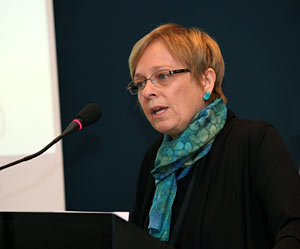You and I may not clearly view the consequences of the Anti-Science Party's Slashing of Research Funding...the CONSEQUENCES will be felt when the U.S. can no longer compete with other nations.
WHOI director bemoans lack of science funding
Woods Hole Oceanographic Institution president and director Susan Avery has announced that she will be leaving her position when her contract ends in June. Merrily Cassidy/Cape Cod Times
By Sean F. Driscoll
sdriscoll@capecodonline.com Posted Nov. 29, 2014 @ 2:00 am
Updated at 7:41 AM
WOODS HOLE – When Susan Avery, director of the Woods Hole Oceanographic Institution, looks ahead to when her tenure ends in June, she is both optimistic and downbeat.
She's excited about what could lie ahead for WHOI, one of the world’s preeminent ocean research institutions, both in the frontiers of pure science and in the "blue economy" – the use of ocean resources. But the downward trend of funding for ocean exploration and science in general? That has her worried beyond her own institution's balance sheet.
“To see (funding) stagnate and decline like it has is very worrisome,” she said. “Yet it is what it is right now. I will continue to be strong advocate for it, but I really think the United States is missing out on what made it a great country by not making that investment.”
Avery is stepping down when her contract ends in June after 7½ years at WHOI's helm.
During her tenure, WHOI has had high-profile coups, including a $41 million renovation of the Alvin, its famed submersible, and the donation of another deep-water sub, the Deepsea Challenger, by movie director James Cameron. Its scientists led a successful search for Air France 447 in the deepest part of the Atlantic Ocean in 2009, examined the effects of the massive Deepwater Horizon oil spill in the Gulf of Mexico and monitored the Pacific Ocean for traces of radiation from the Fukushima nuclear disaster in Japan.
The institution has also had its share of struggles. Federal science funding has been on the decline and WHOI’s government grants dropped about $8 million between 2011 and 2012, from $141 million to $133 million. Avery has pushed WHOI to diversify its funding sources and streamline its operations, but the funding shifts have resulted in some staff cuts.
Avery recently discussed her tenure and what’s in store for the 84-year-old research institution with the Times.
On deciding to leave
Her decision was spurred by long-term strategic planning at WHOI, she said. While the work has been ongoing, the board of trustees is on the cusp of developing a final plan for growth. That process will take about five years, and Avery said she wanted the board to have a director who would be able to both develop and implement the plan.
“When you’re taking on one of these leadership positions and you’re just handed a plan that you don’t have any ownership of, it’s sometimes hard to implement it,” she said. “I just thought it was a good time.”
Avery hasn’t plotted her next move. She and her husband, Jim, still own a home in Boulder, Colorado, where she had been on the faculty at the University of Colorado. Their discussion has centered on what they want out of their next home base and not necessarily where it will be.
“The Northeast certainly checks a lot of those boxes,” she said. “I hope there will be other opportunities I can explore out there.”
On pursuing contracts with Big Oil
WHOI has three major sources of funding: the federal government, philanthropy and contracts with the for-profit sector. Right now, the private sector is an almost-invisible portion of WHOI’s income: around 1 percent of its annual $200 million revenue. But it’s where Avery sees the greatest potential for growth, and the Center for Marine Robotics was created specifically to marry WHOI’s famed work with undersea vehicles with private-sector opportunities.
That work also has the greatest potential for controversy. Avery maintains an almost reflexive defensive crouch when discussing WHOI’s work monitoring the undersea environment at oil company well sites. The work itself doesn’t set her off – she insists that any contract WHOI signs will maintain its scientific integrity and freedom, including intellectual property rights, the open exchange of data and the freedom to publish their results without censoring. WHOI turned down a $3 million contract from the private sector because it didn’t include those very stipulations, she said.
But the criticism from within the scientific community, advocacy groups and the tone of press coverage makes her bristle.
“We are not finding oil for them,” she said about the oil companies. “Most of them are looking for help in environmental monitoring work, which is really exciting for us. We’re looking at how you use robots in environmental awareness observation … in a way that is sustainable and conscientious.”
“There are so many countries that are talking about the ‘blue economy’ right now, and I think it’s important that research connect with that in order to make sure that it’s done well.”
On WHOI's future of ocean science
When her successor is chosen, WHOI’s 10th director and president will come to Woods Hole as technology is allowing scientists to peer into parts of the Earth that just a decade ago were inaccessible. WHOI’s unique mix of science, engineering, education and operations can make it an ideal partner for ocean research and exploration, but it can’t just sit back and wait for opportunity to knock, she said.
“The ocean is still a frontier, and the institution needs to push those frontiers of ocean science and technology."
http://www.capecodtimes.com/article/20141129/NEWS/141129386/101017/BIZ

No comments:
Post a Comment